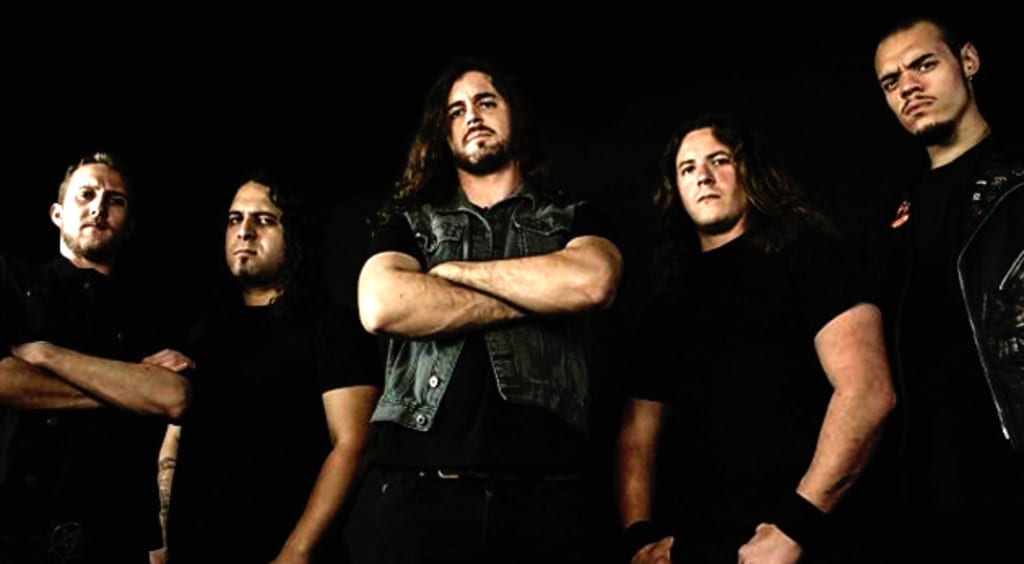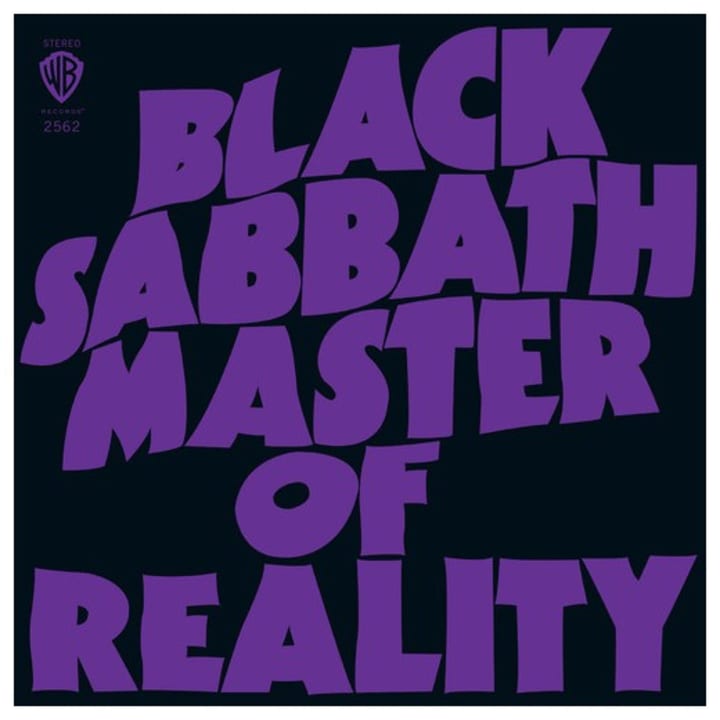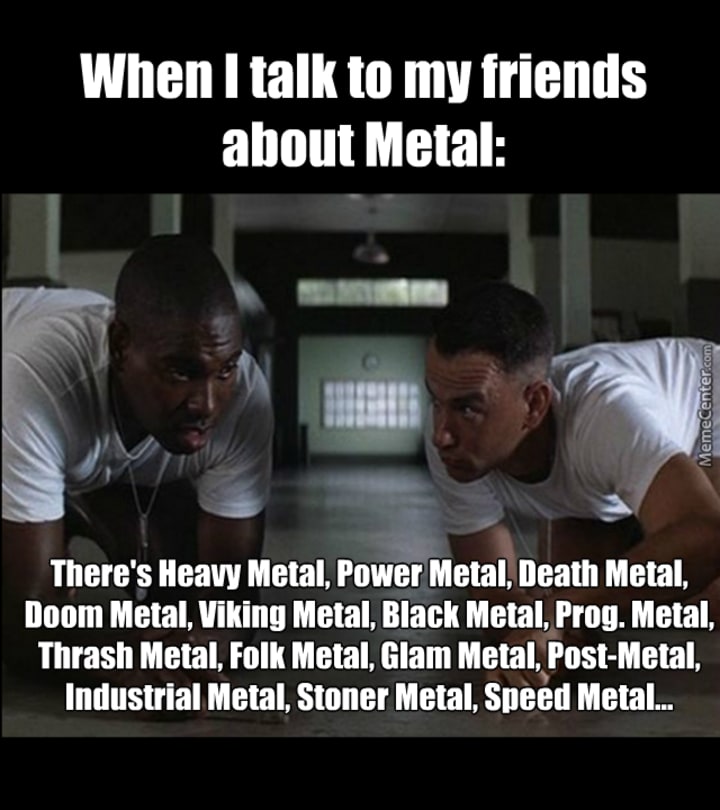The Fall of Heavy Metal
Or Why Does Every New Band Suck?

You may be wondering, "Why-eth the fuck hath thou enticed me with such a headline?" only for me to ask "When-eth the fuck did you cometh from? Doth thou knowst of the heavy metals? Fucketh off!" As I plead for you to come back, I'll actually explain myself.
See, the heavy metal community has been criticized for the past decade or so for the value it's placed on nostalgia. There's a term for this: nostalgic value. It is means what it is at face value, as I've previously described. The nostalgia meter for heavy metal hit critical mass around the era of the Big Four shows.
(For you lay-readers, the Big Four are the four most commercially successful thrash metal bands: Slayer, Megadeth, Anthrax, and Metallica. Thrash metal is a subgenre of heavy metal with and emphasis on speed and doomy-sounding music with lyrical subjects mainly focused on politics, occultism, and violence and occasionally focused on partying, fantasy, and personal struggle. For more detail, please read: https://en.wikipedia.org/wiki/Thrash_metal)
There's an arguable timeline for this as the paradigm shift occurred in mid- to late-2000. You see, during the '80s, metalheads were all about the new and upcoming music and bands as the genre was once perceived as a subgenre of rock and encountering its second decade of life. Much like people, music has a time span of maturity that rivals the average adult male. The '70s were heavy metal's formative years, the '80s were a time when heavy metal was finding and solidifying its identity, much like tweens and teens. The early '90s seemed to find heavy metal as a whole wandering into a cozy start, but ended up developing a drinking and gambling problem once it got kicked out of the house. It went backpacking in Europe for a while, but life wasn't any easier. It tried a new look and tried to break back into its parents' house, but the results weren't too hot. The 2000s saw heavy metal stumble out of its addiction, go to rehab, and get back on its feet. Arguably, heavy metal's resurgence, while riding on the backs of Metallica, Slayer, and Pantera in the US, was synonymous with the release of Megadeth's "The System Has Failed". Arguable still, it's even more surmisable that heavy metal's resurgence as a whole was due to the success of the Guitar Hero and, soon after, the Rock Band game franchises.
"Get to the fucking point!" Fine. The 2010s, like the fifth decade of the adult male life, was dedicated to nostalgia and "the good old days", unappreciative of its new endeavors and accomplishments despite the obvious slump. So, what happened?
Let's recap a bit. The '70s were the formative years of heavy metal. You can pick out metal albums from this decade, but music enthusiasts will argue to the death over what constitutes a heavy metal release, from Blue Cheer's "Vincebus Eruptum" to Saxon's "Wheels of Steel" (but will almost universally agree on Black Sabbath's "Paranoid" and "Master of Reality").

Truth be told, the coughing at the beginning of this album is of a neckbeard about to correct me.
Most everyone listening to metal then were rock enthusiasts aged 10-25 and, of course, growing older. The '80s were the tween/teen years, where the fans were now 13-35. Heavy metal was maturing and by the end of the decade, there would be five established subgenres (Thrash, Doom, Death, Speed, and Glam), two budding subgenres (Power and Grindcore), one everchanging (Black), and the daddy of them all (Heavy). (For those of you arguing NWOBHM is a subgenre, it's not, it's a style/movement.) The '90s is when US radio wanted to kill heavy metal because they knew the market would be oversaturated and wanted something fresh. Nu-metal came along and almost destroyed its image despite wanting to be its face. The 2000s came, Linkin Park was Nu-metal's siren song, and heavy metal wanted to be what it once was, the bold ass-kicker it was meant to be. Now that people were paying attention, they showed it had a new bag of tricks alongside the old ones. However, everyone was more familiar with the older tricks, so when the 2010s came around, that became the focus.
"So what's the problem!?" Remember the "new bag of tricks"? That was the new bands - Killswitch Engage, Warbringer, Viraemia, Obscura, Disturbed (just to name a few) - and the new subgenres - Melodic Death Metal, Blackened Thrash Metal, Blackened Death metal, Technical Death Metal, Folk metal, Viking metal, Gothic Metal, Stoner Metal, Death-doom, Funeral Doom, Symphonic metal, you name it! However, look anywhere, go to your local show where you'll see nothing but Metallica, Megadeth, and Slayer shirts and your occasional Venom, Helloween, or Sabaton. Go to YouTube, check MetalSucks.com and Blabbermouth.net. Where's the focus? The older bands rising and falling, bands that made heavy metal popular and popular bands within the genre's past are the ones making headlines, even on more elitist sites like Metal Sucks. You see what I'm getting at? It's the older bands getting all the attention now? Why? Because all the kids that listened to heavy metal grew up. All the 13-35 year olds in the '80s that were listening to heavy metal are now 43-65. And it wasn't cool to listen to heavy metal for about thirteen years, so you bet there's a generational gap. Finding a metalhead between the ages of 28 and 40 is really hard. Again, go to a show, everyone's really young or really old with very few of those in-betweens. You'll hardly find an early millennials/late Gen X-ers at a show, usually you'll find late Millenials, older Gen-Xers, and late Boomers.

Pictured: A Gen-Xer that doesn't count.
"Wait, I thought about this was about the nostalgia factor." I'm coming back to that. What causes the nostalgia factor anyway?
First let's go back to what I said before, by the end of the '80s, there were eight subgenres of heavy metal either formed or forming and one daddy (mmm). EIGHT! BY 1990! BEFORE THE SUBGENRE WAS TWENTY YEARS OLD UNOFFICIALLY! It took jazz ten years to have a subgenre (big band swing) and rock only had, at most, five before the 60s were over! On top of that, most of them developed in the 80s! The only exceptions here are doom and speed. That's a lot of metal genres for one decade. Let's go further, all those other subgenres I mentioned? Yeah, most of them developed in the 90s, mostly in the US, South America, Europe, and Japan. I only named eleven subgenres, I didn't even break the levees yet. Genre ubiquity is the term here folks. There's so many subgenres of heavy metal that there are memes devoted to that idea alone.

Damn, they beat me to it.
Why discover anything new when you can devote your time to something you already know you love? That's the same emotional energy a lot of people spend trying to decide on a career.

Level of knowledge or intensity of erection?
Is it any wonder that it's easier to focus on older bands? Because that's what most people know anyway, and the whole Big Four thing? That was an period that basically spanned the course of two years where the most commercially successful thrash metal bands got together to play. Not that there's any merit to their abilities; there are countless articles, biographies, and documentaries that include these musicians as among the most talented of their generation if not the genre.
What else causes the nostalgia factor? Well remember the ubiquity of the subgenres? Well, multiply all the subgenres by twenty, and that's the average number of well known bands in that subgenre. If there are thirty subgenres of heavy metal (and yes, there are), then there are six hundred "well-known bands". Can you name six hundred bands? Good, you're a person. Otherwise, you are the website known as the Metal Archives, which lists over 500,000 metal bands to ever exist.

Pictured: You.
Barring bands sharing members and the bands that don't qualify for the encyclopedia (yes, you must qualify for the Metal Archives), that's over 2,500,000 individuals to ever play heavy metal - the genre and its subgenres. With those overwhelming statistics, it's no wonder people don't go out and explore more heavy metal and just stick to what they know, a.k.a. the bands that mostly popular during the '70s and '80s.
Remember the generation gap? I fibbed a bit, the late Gen X-ers are there, but, remember metal backpacking in Europe for a bit before getting all edgy? Heavy metal absolutely thrived in Europe, which helped because Europe is a home continent for heavy metal, especially during it's formative years. Just like during all of rock history, heavy metal followed the same back and forth between Europe and North America. It especially helped when the Berlin Wall came down, effectively marking the end of the Cold War. Those Gen X-ers? They're mostly in Europe. The generation gap exists mainly in the US. A lot of the guys and girls across the sea are between their late 20s and late 40s currently making heavy metal if they're not genre pioneers. But because older people like to take control of things back here in the US, the older heavy metal fans are in control of the tabloids and the airwaves. Thus, nostalgia runs freely amuck.
Next is the market itself. Remember, again, radio is king in the US, and they want metal gone. They want to make conservative righty moms and triggered lefties happy; there's no music that makes both sides of the political spectrum cringe harder than heavy metal. Modern hip-hop? The worst odds you can get are a 50/50 chance of either utter praise or flat hatred.

GODDAMMIT!
Does it matter that half the lyrics of heavy metal are Tolkkien-esque RPG hacks and only 15% is only about stabby-stabby demons? No. All they want is money, and no one gets paid when the other 35% of metal is screaming about how the government is evil and both the left and the right suck.

Jake and the Neverland Pirates: The Band
So we've got:
- Aging fans that grew up with the genre controlling metal media
- Public radio that wants metal gone, essentially not having a home in the US outside alternative media, which is controlled by aging, nostalgic fans
- A musical genre that grew so quickly it was able to bite its tail before growing sharper fangs
- A ubiquitous Katrina-level of bands and subgenres that makes electronic music go, "Damn, that's a lot of subgenres," effectively making listening to new music increasingly intimidating.
A lot more about this issue can be read here: http://www.metalsucks.net/2016/10/20/whats-the-next-big-trend-in-metal/. Are we missing anything? Oh, yes, us. We, the fans who have found heavy metal in the past two decades or so, the ones that found heavy metal after its slump. We are the ones that failed you. The trend usually is that fans generally are the same age as the performers. Not a rule, a trend. Unlike other modern musical genres, the performers set the trend, not the audience. The way it is nowadays, a lot of the underground trend seems to favor extremely talented musicians that are further pushing the boundaries of progressive metal even further than they are now, despite the wave of nostalgia at the surface of heavy metal. That in combination with the technical death metal genre and the influence of our teenage emo phase (not mine, but ours) bleeding in via melodic metalcore from just ten to fifteen years ago, the result seems to be progressive death metal and deathcore taken to new catastrophic heights.
I will be the first to tell you I'm not of the trend, but I'm not oblivious to it and I will acknowledge it for what it is: the millennial generation's interpretation of heavy metal. This is not by any means what defines heavy metal today, but ask anyone my age today, they'll tell you their favorite modern bands: Rings of Saturn, Archspire, Between the Buried and Me, Ne Obliviscaris, Revokation, Whitechapel, Viraemia, Spawn of Possession, and the like. I'm not going to say these bands are bad, I personally don't enjoy them, but this is where the majority of the trend is, at least in the US, and I can fully understand that. These are all fully capable and apt musicians who's penchant for songwriting leads to new heights and standards for heavy metal, as those leading an art form should do. I'm a thrasher, but this is my generation's metal, it's safe to say. The problem, though, is part of why I don't enjoy it personally and why the nostalgia mentality continues to thrive: the music is inaccessible and complex. It does indeed turn the casual listener away, and while I am far from the casual listener, I don't tend to go to an analog TV and listen to the static.

So music, very challenge. Ear confuse.
My generation, millennials, have closed the proverbial door on those not enough in tune with their personal heavy metal sensibilities to be able to digest something as complex. And we've not taken a more aggressive approach to controlling the media for exposing the music we as a generation enjoy. Trust us, the old farts at Viacom know this music exists, but they don't want to bank on it because it's not Judas Priest-esque. Safe is the way to play despite the entire ideology picked up by heavy metal during the '80s being that of rebellion.
So what can we do? Well, we can start by telling Gen X-ers to fuck off. "Wait, I thought this was about why new bands suck." Exactly, Mr. Strawman, now go bring me a meme! New bands suck because the geezers tell us they are. That's it. Every new Thrash Metal band is compared to Metallica or Slayer, every new Death Metal band is compared to Cannibal Corpse, every new black metal band is compared to Darkthrone. Do you see what I'm getting at? Those nostalgia goggles are on real tight for those older Gen X-ers and there aren't enough younger Gen-Xers and early Millenials to level them out. The heavy metal world just kind of gave them the reigns in the US and Canada. South America and Europe love their metal no matter what, but English-speaking North America is way too picky, dare I say, entitled.
The next decade coming is a new dawn for Heavy Metal. It was uncorked with the death of Ronnie James Dio and will have another big event after Slayer's farewell tour. Lemmy's gone, the original lineup of Motörhead is gone, Jeff Hanneman is gone, Clive Burr is gone, God wants Tony Iommi, Malcolm Young is gone, Black Sabbath is retired, Slayer is retiring, Ozzy is retiring, and Timo Tolkki is effectively missing. The old vanguard of Heavy Metal is dying, both figuratively and (unfortunately) literally, and it will be time for newer bands to take Heavy Metal's helm (Manowar shall always be the true kings, so no crown can be given) as cheesy as that may sound. There's going to be a huge power vacuum created once Slayer is gone. Either we, the Millenials, start filling the spaces so that we may set an example for Gen Z, or Heavy Metal will burst into flames.
I myself am guilty of it too, only because I also place a lot of value in older bands, because I recognize their merits. However, it will be soon when I must almost accept this reality at its full; if heavy metal is not taken care of and if new(er) bands are not lifted up to mirror the successes of older bands and left in the shadow of their predecessors, then heavy metal will be lost to the sands of time, solidifying its heyday. However you may feel, whether or not you believe I wrote this think piece as a scapegoat for my emotions, nonetheless, Heavy Metal as a genre will be committed to the ground because of nostalgia.
I'll leave this on a positive note, though. So many bands are innovative today and can actually be good, Greg! Even in older metal subgenres, bands have the ability to release tremendous music. Other people that know me well will look at this article (assuming they've read it) and sigh as I bring up this album, because it's absolute fucking gold and is officially in my personal top ten albums of all time. For a relatively new band that falls outside the current trend and into my personal sensibilities, I recommend this album to both Heavy Metal fans and non-metal fans, fans of the current trend and fans of the old vanguard. This is an album by a band known as Vektor that, while formed in 2002, did not release an album until 2009, making calling them new essentially warranted, which is why I used the word "new-ish". The album is called "Terminal Redux" and may be one of the best albums ever recorded, at least in my Thrash Metal biased goggles. There is both a substantial amount and not enough information about this album. I highly recommend it, my personal highlight is "Collapse", the ninth song on the album.

Oh, look, a geezer! I was wondering when you'd show up.






Comments
There are no comments for this story
Be the first to respond and start the conversation.